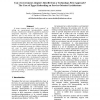Free Online Productivity Tools
i2Speak
i2Symbol
i2OCR
iTex2Img
iWeb2Print
iWeb2Shot
i2Type
iPdf2Split
iPdf2Merge
i2Bopomofo
i2Arabic
i2Style
i2Image
i2PDF
iLatex2Rtf
Sci2ools
HICSS
2010
IEEE
2010
IEEE
Can e-Government Adopters Benefit from a Technology-First Approach? The Case of Egypt Embarking on Service-Oriented Architecture
It seems common sense that “policy matters” in setting up e-government interoperability, mainly because collaboration should be guided by dedicated integration objectives and implementation rules. However, this is not always the case: this paper focuses on Egypt implementing technology and systems based on service-oriented architecture, largely without the expected organizational readiness regarding the interoperability effort. Does this mean that the current initiative is bound to fail? Or is the Egyptian approach maybe an appropriate strategy for countries which do not want to repeat painful non-interoperability experiences of their developed peers? This case study research seeks to provide evidence to what extent the Egyptian experience indicates a model for e-government adopters how to best develop interoperability. The paper concludes that a technology-first approach indeed can be held accountable for waste of time and resources due to delays in inevitable collaborative organ...
Biometrics | E-government Interoperability | E-government Interoperability Strategy | HICSS 2010 | Interoperability Effort | System Sciences |
| Added | 17 May 2010 |
| Updated | 17 May 2010 |
| Type | Conference |
| Year | 2010 |
| Where | HICSS |
| Authors | Ralf Klischewski, Ranwa Abubakr |
Comments (0)

